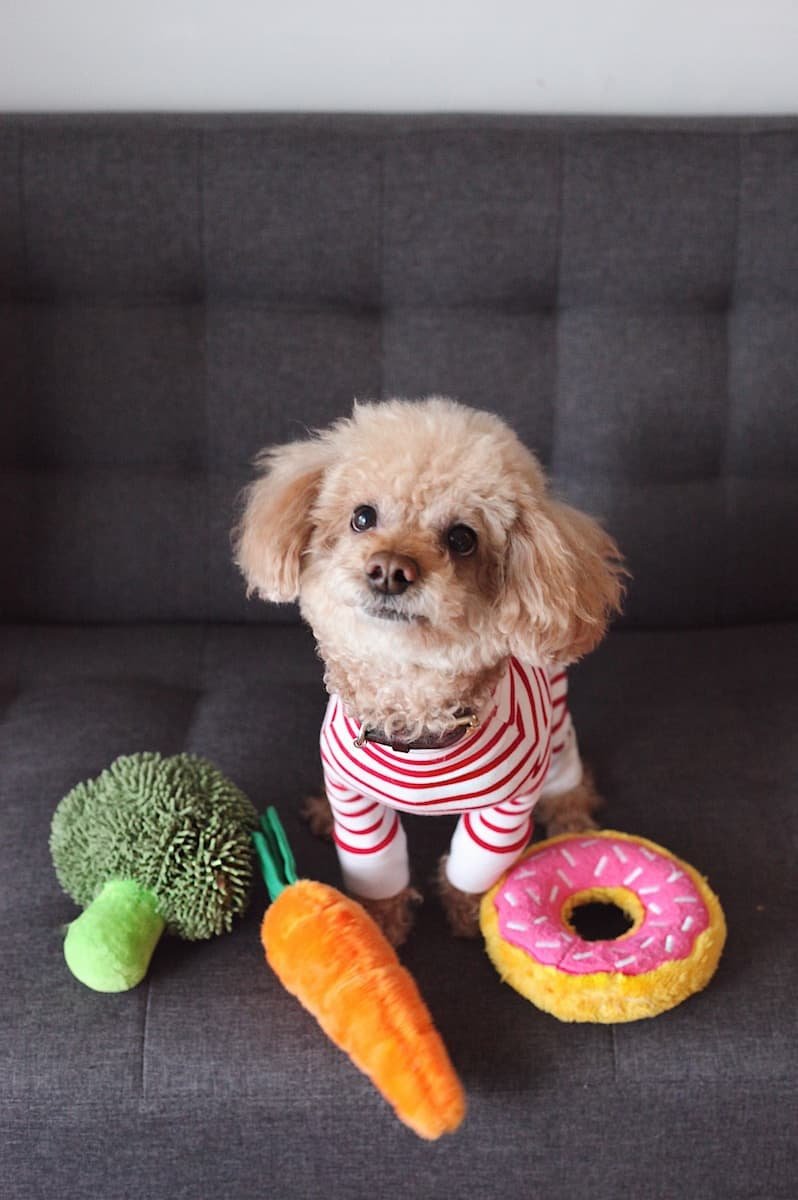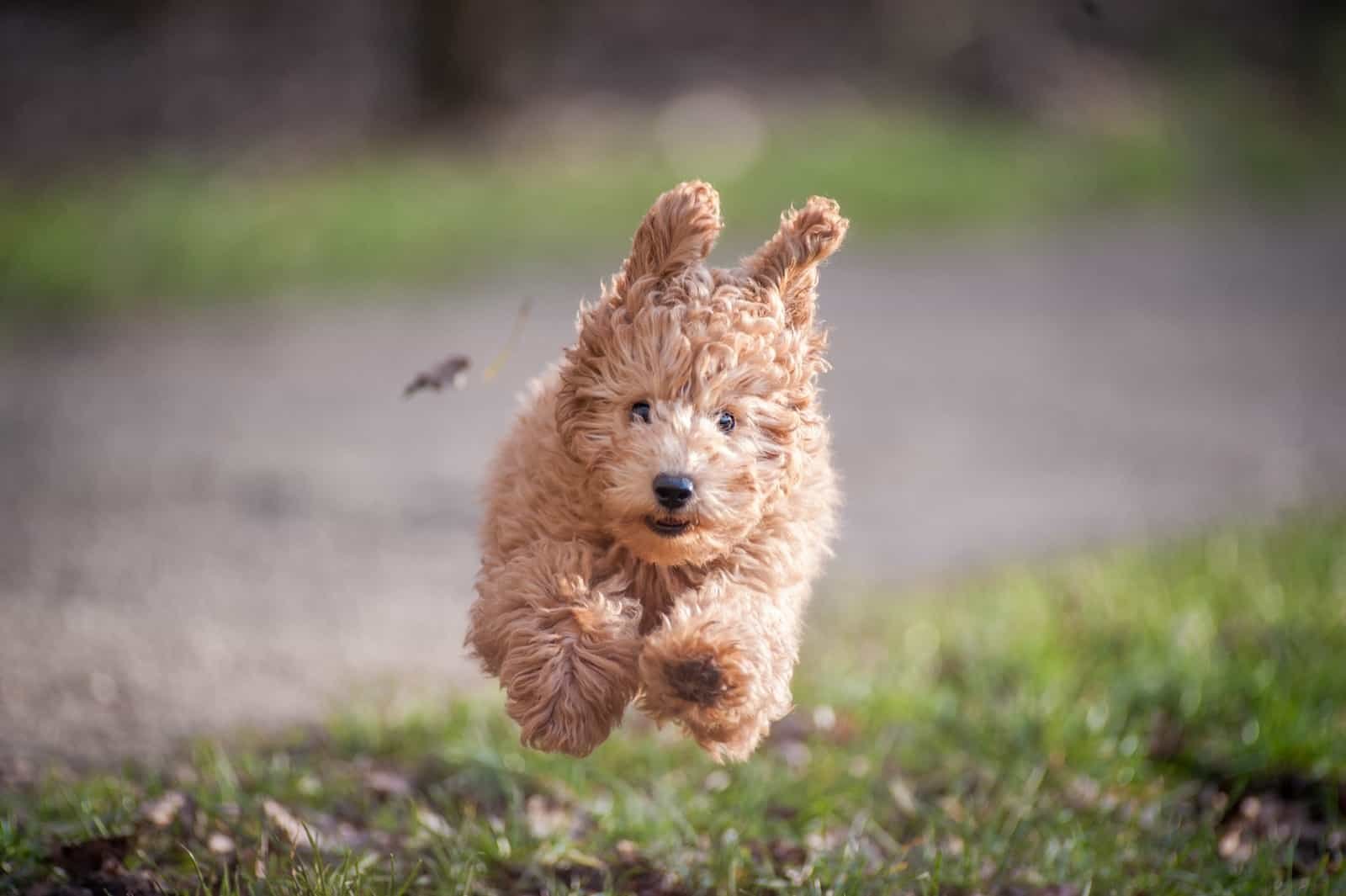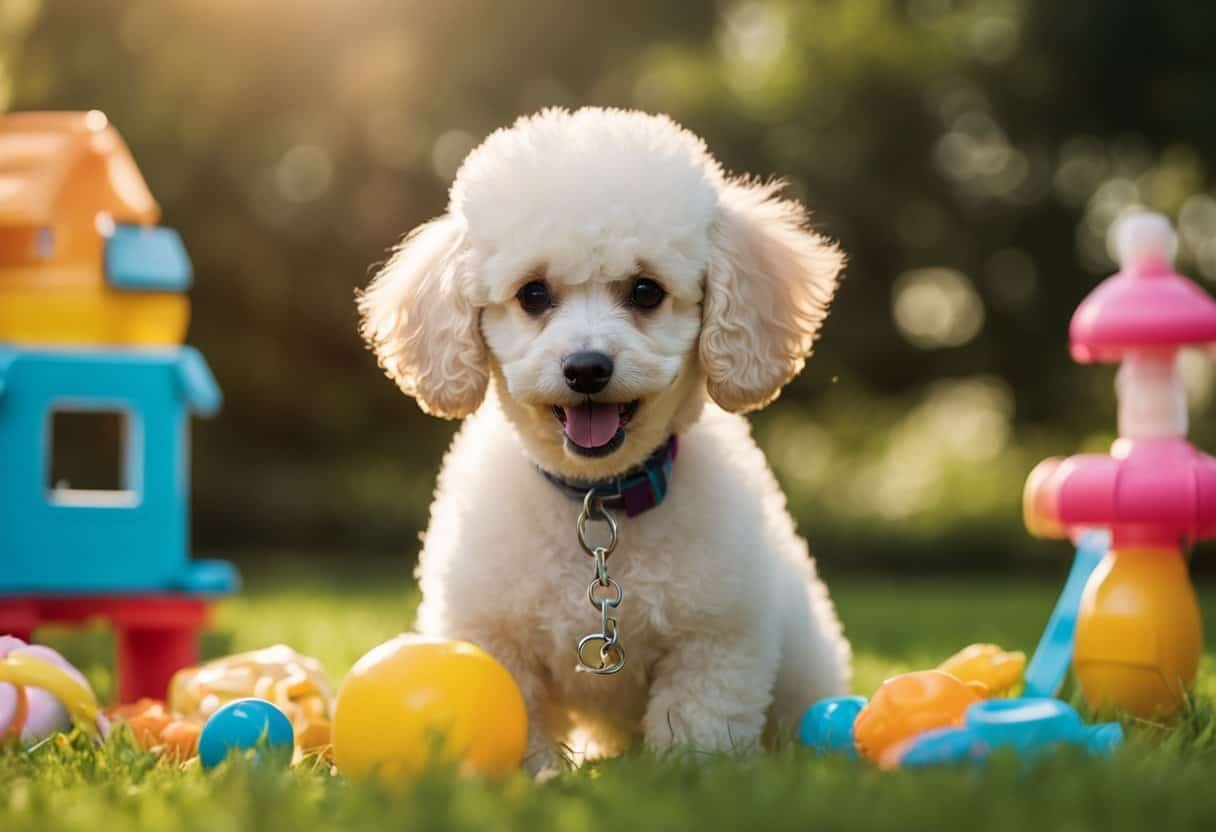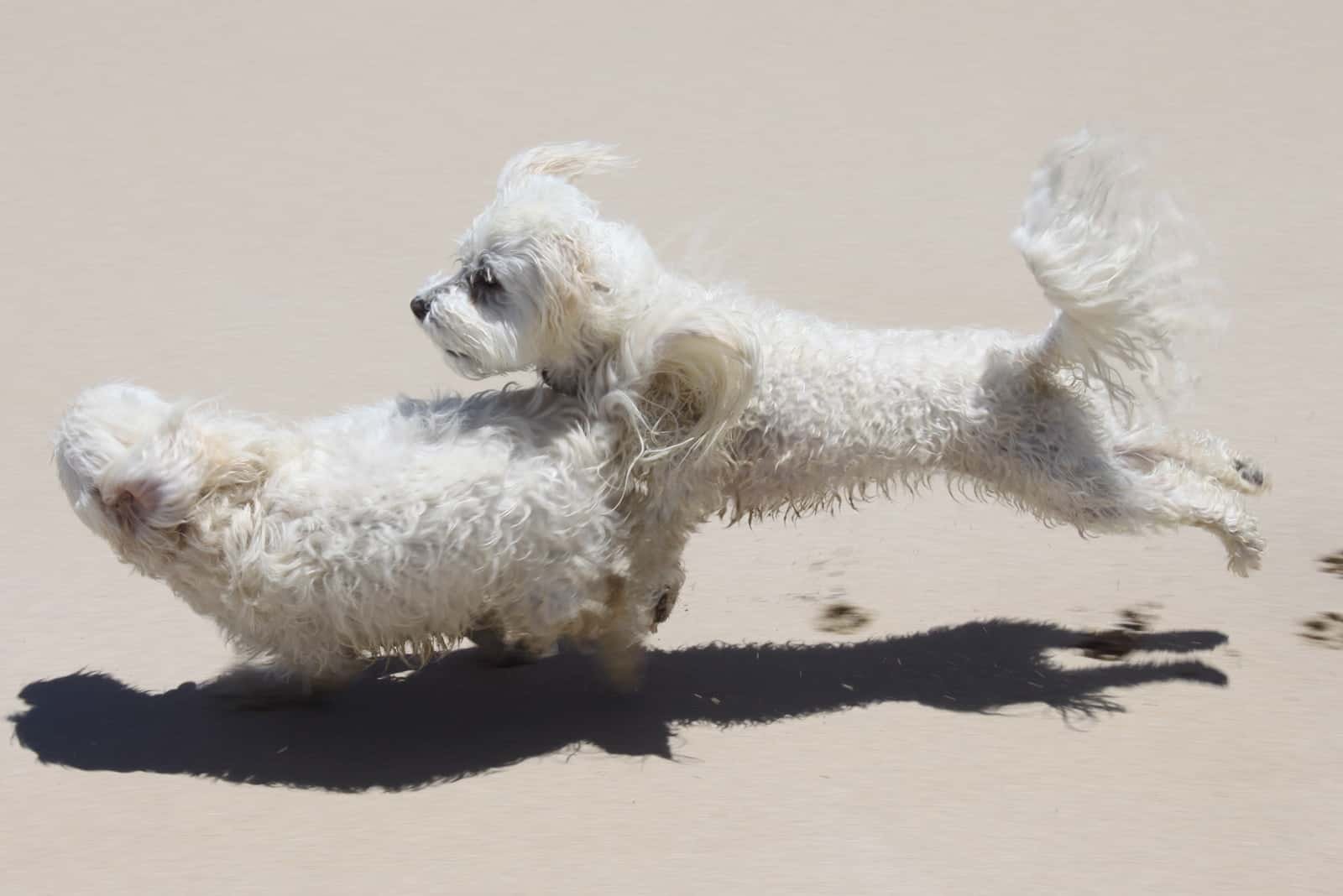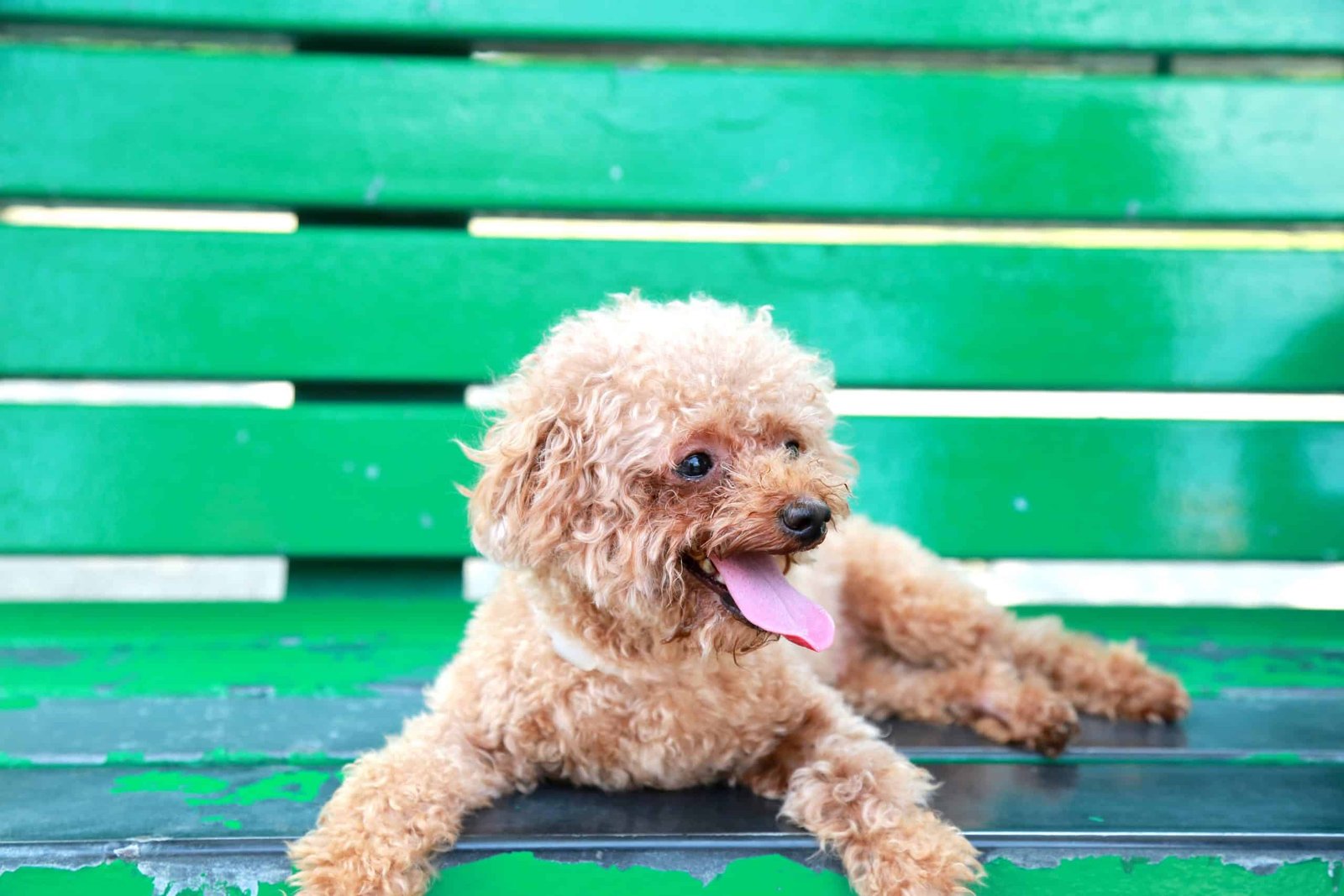
The Poodle, a highly intelligent and versatile breed, has captured the hearts of dog enthusiasts worldwide. Known for their distinctive curly coats and array of colors, Poodles come in three size varieties: Standard, Miniature, and Toy. Each size boasts its unique charm, yet all Poodles share similar characteristics.
Poodles have a rich history as water retrievers, which accounts for their impressive activity levels. This captivating breed also makes excellent companions for those with allergies because of their hypoallergenic qualities. With proper care, Poodles can live fulfilling lives, ranging from 10 to 18 years depending on their size variety.
However, they may be susceptible to certain health conditions, such as sebaceous adenitis, if not given proper attention. Overall, Poodles are a beloved breed due to their intelligence, loyalty, and charm, making them suitable pets for people of all ages.
Related Reading: Local Poodle Rescue Organizations – Find Dogs in Your Area
Related Reading: Rescue Poodles: A Complete Guide
Related Reading: Rescue Dogs: A Complete Guide
Related Reading: Poodle Rescue Guide – Adopting Understanding Rescue Dogs
Overview of the Poodle Breed
The Poodle, an elegant and wise breed, is renowned for its distinctive curly coat. The three different size varieties – Standard, Miniature, and Toy – all share similar characteristics, making them a versatile choice for dog enthusiasts. Poodles are highly active dogs, requiring daily exercise to maintain their physical and mental well-being. All sizes are also very affectionate, making them exceptional family pets due to their intellect, adaptability, and energy level.
Poodles are often lauded for their hypoallergenic properties, making them especially popular among people with allergies. Their curly coat produces minimal dander and loose hairs, which is beneficial for those sensitive to pet allergens. However, daily brushing is necessary to prevent matting and maintain the health of their coat. It is also essential to avoid bathing Poodles in hot water, as it can damage the texture of their fur. Instead, opt for lukewarm or cold water to preserve their coat’s natural qualities. Poodles’ history as water retrievers makes them excellent swimmers, and engaging them in water-based activities, such as swimming or playing fetch in cold water, is a fantastic way to keep them entertained and physically fit.
Overall, the Poodle is a popular breed of dog due to its intellect, activity level, and hypoallergenic properties. While this breed is generally healthy, they can be prone to certain conditions such as hip dysplasia or sebaceous adenitis, which can cause skin diseases if left untreated. Depending on the size variety, Poodles typically range from 10-18 inches tall and have a life expectancy of 10-18 years.
The Poodle is a wonderful companion for those seeking an active, smart, and hypoallergenic pet. With various sizes and colors to choose from, this breed is sure to bring joy and excitement into any home. In the following sections, we will delve deeper into the different varieties of the Poodle breed, their grooming requirements, exercise needs, health concerns, and training tips.
The Three Varieties of Poodles
Standard Poodle
The Standard Poodle is the largest of the three Poodle varieties, typically standing over 15 inches tall at the shoulder and weighing between 45-70 pounds. This size variety is often considered the original Poodle, bred for water retrieval and duck hunting in Germany and France. Standard Poodles are known for their athleticism, making them suitable for various dog sports and activities, such as agility, obedience, and even herding. They are also commonly utilized as service dogs due to their perception and trainability.
Miniature Poodle
The Miniature Poodle stands between 10-15 inches tall at the shoulder and typically weighs between 15-17 pounds. This size variety shares many similarities with its larger counterpart, the Standard Poodle, but in a more compact package. Miniature Poodles are still quite athletic and enjoy participating in dog sports like agility and obedience. Their smaller size makes them well-suited for apartment living or homes with limited space, provided they receive sufficient exercise and mental stimulation.
Toy Poodle
The Toy Poodle is the smallest of the three varieties, standing under 10 inches tall at the shoulder and weighing between 4-6 pounds. Despite their diminutive stature, Toy Poodles are known for their spunky personalities and playful nature. They make excellent companions for seniors, people with limited mobility, or those who prefer a smaller, more portable pet. Toy Poodles still require exercise and mental stimulation, but their needs can be more easily met indoors with play sessions and interactive toys.
Grooming Requirements
Poodles are known for their unique, curly coats, which require regular grooming to maintain their appearance and health. Daily brushing is necessary to prevent matting and tangles, while professional grooming is recommended every 4-6 weeks to keep their coat in optimal condition. Poodle owners can choose from a variety of clips and styles, such as the popular “puppy cut” or the more elaborate “continental clip,” depending on their preference and the dog’s lifestyle.
Poodles should be bathed as needed, typically every 3-4 weeks, using a gentle dog shampoo formulated for sensitive skin. As mentioned earlier, avoid using hot water when bathing Poodles, as it can damage the texture of their coat. Instead, opt for lukewarm or cold water to maintain their coat’s natural curl and shine. Regularly inspect and clean your Poodle’s ears to prevent infections, and keep their nails trimmed to avoid discomfort during daily activities.
Exercise Needs
Poodles are energetic and athletic dogs, requiring daily exercise to maintain their physical and mental well-being. Standard Poodles may require more exercise than their smaller counterparts, but all varieties benefit from regular walks, play sessions, and mentally stimulating activities. Poodles excel in various dog sports, such as agility, obedience, and rally, providing an excellent outlet for their energy and intelligence.
Poodles’ history as water retrievers makes them naturals at swimming, and many Poodles thoroughly enjoy water-based activities. Including swimming or playing fetch in the water can add variety to your Poodle’s exercise routine and help keep them engaged and happy.
Health Concerns
While Poodles are a healthy breed, they can be prone to certain health issues, some of which are specific to their size variety. Some common health concerns in Poodles include:
- Hip dysplasia: A genetic condition affecting the hip joint, more commonly seen in Standard Poodles.
- Sebaceous adenitis: A skin condition that can cause hair loss and scaly skin, often affecting Standard and Miniature Poodles.
- Progressive retinal atrophy (PRA): A genetic eye disorder that can lead to blindness, affecting all Poodle varieties.
- Patellar luxation: A condition in which the kneecap dislocates or moves out of its normal position, more commonly seen in Miniature and Toy Poodles.
- Addison’s disease: A hormonal disorder affecting the adrenal glands, seen in all Poodle varieties.
Regular veterinary check-ups, a balanced diet, and proper exercise can help maintain your Poodle’s overall health and well-being. It is also essential to work with a reputable breeder who conducts health testing on their breeding dogs to minimize the risk of genetic health issues.
Training Tips
Poodles are highly creative and eager to please, making them excellent candidates for training. They respond well to positive reinforcement techniques, such as treats, praise, and play, which help build a strong bond between owner and dog. Poodles can excel in various disciplines, from basic obedience to advanced dog sports, making them a versatile and enjoyable breed to train.
Early socialization is crucial for Poodles to ensure they grow up to be well-rounded, confident adults. Expose your Poodle puppy to a variety of people, animals, and environments to help them develop positive associations and coping skills. Poodles can be sensitive dogs, so it is essential to use gentle, positive training methods to encourage their natural curiosity and eagerness to learn.
Enrolling in group obedience classes or puppy kindergarten can be beneficial for both Poodles and their owners, providing a structured environment for learning and socialization. Poodles are known for their problem-solving abilities, so incorporating puzzle toys and interactive games into their daily routine can help keep their minds sharp and engaged.
Quick Summary
The Poodle is an enchanting breed that offers a unique combination of intelligence, athleticism, and charm. With three size varieties to choose from – Standard, Miniature, and Toy – there is a Poodle suitable for every lifestyle and living situation. Their hypoallergenic properties make them an excellent choice for individuals with allergies, while their affectionate nature and adaptability make them wonderful family pets.
To ensure your Poodle lives a long, happy, and healthy life, it is crucial to provide proper grooming, exercise, and mental stimulation. Regular veterinary check-ups and working with a reputable breeder can help minimize the risk of health issues. Poodles can be a joy to train, making them suitable companions for both first-time and experienced dog owners.
Whether you are seeking an athletic partner for dog sports, a loyal and loving family pet, or a spirited companion to share your life’s adventures, the Poodle is a breed that offers endless possibilities for joy and companionship.
Varieties of the Poodle Breed
The Poodle, a highly resourceful and enthusiastic breed, is available in three distinct size varieties: Standard, Miniature, and Toy. While all three share the same fundamental characteristics, there are subtle differences among them. Standard Poodles typically stand at 15-24 inches tall and can weigh between 40 and 70 pounds, making them perfect companions for outdoor activities such as swimming or hiking. Miniature Poodles are smaller, measuring 10-15 inches tall and weighing 12-17 pounds. They boast a similar activity level to the Standard but in a more compact package. Last, Toy Poodles are even smaller than the Miniature variety, standing 8-10 inches tall and weighing 4-7 pounds. Despite their diminutive size, they still require regular exercise and mental stimulation to stay healthy and content.
Regardless of size, all Poodles share common traits such as intellect, loyalty, and hypoallergenic properties. This breed has grown increasingly popular over the years due to its family-friendly nature and suitability as companions for active households. With various sizes available to accommodate any lifestyle or budget, the Poodle will be a fantastic addition to any home!
Physical Characteristics
The Poodle is a breed renowned for its curly coat and range of sizes. The Standard variety stands at 15-24 inches tall and can weigh up to 70 pounds. Miniature Poodles are 10-15 inches tall and weigh 12-17 pounds, while the Toy variety stands 8-10 inches tall and weighs 4-7 pounds. Despite the differences in size, all three varieties share the same basic characteristics, making them wonderful companions for families of all sizes.
Poodles possess hypoallergenic properties, meaning they are less likely to cause allergies compared to other breeds. They are also high-energy dogs, making them perfect for people who love to stay active with their canine companions. A daily exercise routine is essential for this breed to maintain health and happiness.
Regular brushing is necessary to maintain their curly coats and help reduce shedding around the home. When bathing a Poodle, cold water should be used, as hot water may damage their skin and fur. It’s also important to know that this breed may be more susceptible to certain health issues, such as hip dysplasia or sebaceous adenitis. Discuss these concerns with your veterinarian when considering a Poodle as a pet. With proper care and attention, this intelligent breed can live between 10-18 years!
A Poodle makes a great companion for any family, offering the perfect combination of quickness, activity level, and hypoallergenic properties. With the right care and attention, a poodle can become your best friend for many years to come! Now read on to learn more about the beauty of the Poodle’s curly coat!
Curly Coat
The Poodle’s curly coat is one of its most iconic features. All three size varieties—Standard, Miniature, and Toy—share the same basic characteristics. The curls give the breed a unique appearance, setting them apart from other popular breeds such as Labradors or Golden Retrievers. The curls are also functional when it comes to water retrieving, as they provide insulation against cold temperatures while swimming.
Daily brushing is necessary to maintain their curly coats and help reduce shedding around the home. When bathing a Poodle, cold water should be used, as hot water may damage their skin and fur. With proper care and attention, this smart breed can live between 10-18 years, given that regular exercise routines are essential for keeping them healthy and happy.
In conclusion, the Poodle’s distinctively curly coat makes them among the most popular dog breeds globally, thanks to their intelligence, hypoallergenic properties, activity level, and striking appearance. With the right care and attention, a poodle can be your best friend for many years to come!
Size Varieties
Poodles are available in three size varieties: Standard, Miniature, and Toy. Standard Poodles are the largest of the breed, standing 15 to 24 inches tall and weighing between 40 and 70 pounds. Miniature Poodles measure between 10 and 15 inches tall and weigh 12-17 pounds, while Toy Poodles typically reach between 8 and 10 inches tall and weigh 4-7 pounds. All sizes of Poodle require daily exercise, but because of their energy levels, smaller varieties may be more manageable for people with busy schedules or limited living space.
The life expectancy of a Poodle is around 10-18 years, depending on breed size and care. Larger breeds have shorter lifespans than smaller breeds because they are more prone to health issues, such as hip dysplasia or skin diseases like sebaceous adenitis. Besides regular exercise, proper nutrition is essential for maintaining your dog’s health and happiness.
No matter which size you choose, a poodle can make a great family pet. They are resourceful animals with an inquisitive nature, making them excellent water retrievers and loyal companions. With proper care and attention, these adorable dogs can bring many years of joy to your home!
Color Variations
Poodles come in a wide variety of colors, including black, white, silver, apricot, and blue. The color of the coat is determined by genetics and can be influenced by environmental factors such as nutrition or exposure to sunlight. Regardless of the color variation, all Poodle coats are equally curly and dense.
Poodles have been popular for centuries, most likely due to their distinctive appearance. It is not uncommon to see a Poodle walking down the street with its owner because they are friendly and enjoy being around people. Because of their easy-going temperament, they make great family pets.
Despite their showy looks, Poodles require daily brushing and regular grooming sessions to keep their coats mat-free. Poodles should also be bathed in cold water every two weeks to prevent skin irritation caused by warm temperatures. With proper care and attention, these astute dogs will bring many years of joy into your home!
Life Expectancy
With proper care, they can live a long and healthy life. The average life expectancy of a Poodle is 10-18 years; however, this can vary depending on size and genetics. Generally, Standard Poodles tend to live the longest, followed by Miniature and Toy Poodles.
To ensure your Poodle has a long and healthy life, it is important to provide them with daily exercise, proper nutrition, and regular veterinary check-ups. As with any breed of dog, Poodles may be susceptible to certain health issues such as hip dysplasia or sebaceous adenitis. It is also important to note that some sizes of Poodle may be more prone to skin diseases than others.
Overall, Poodles are a rational breed known for their loyal companionship. With the right amount of love and attention, these active dogs can bring many years of joy into your home!
Height and Weight Ranges
Poodles come in a wide variety of sizes, making them a popular breed for many different types of households. Standard Poodles are the largest type and can range from 15 to 24 inches tall at the shoulder, weighing between 40 and 70 pounds. Miniature Poodles stand 10-15 inches tall and weigh 12-17 pounds. The smallest type of Poodle is the Toy variety, typically standing 8-10 inches tall and weighing 4-7 pounds.
No matter what size you choose, it is important to ensure that your Poodle’s weight corresponds with their size in order to maintain their health. Overweight Poodles may suffer from obesity-related diseases such as diabetes or joint problems. It is also important to note that larger Poodles may require more exercise than smaller varieties due to their higher activity levels.
When choosing a Poodle, it is important to consider the lifestyle of your household as well as your own individual needs. Each size variety offers unique benefits, and understanding your preferences and lifestyle will help you make the best decision for both you and your future canine companion.
Temperament and Personality
Poodles are known for their intelligence, adaptability, and friendly demeanor. They are typically good with children and other pets, making them excellent family dogs. Poodles are eager to please and highly trainable, which has led to their success as service dogs, therapy dogs, and in various dog sports, such as agility and obedience competitions.
Despite their elegant and sometimes delicate appearance, Poodles are athletic dogs that enjoy physical activities and mental stimulation. Their high energy levels and intelligence make them well-suited for interactive games, puzzle toys, and training sessions. They are also known for their playful and affectionate nature, forming strong bonds with their families.
Socialization and Training
Early socialization and training are essential for any dog breed, and Poodles are no exception. Exposing your Poodle to various people, animals, and environments will help them develop into well-adjusted and confident adults. Poodles are intelligent and eager to learn, making them a pleasure to train. Positive reinforcement methods, such as treats, praise, and play, are effective ways to teach your Poodle new commands and behaviors.
Grooming Requirements
Poodles are known for their curly, dense coats, which require regular grooming to prevent matting and maintain overall coat health. Depending on your Poodle’s specific coat type and your personal preferences, professional grooming may be necessary every 4-6 weeks. At home, daily brushing with a slicker brush and comb can help minimize tangles and shedding.
Poodles are also known for their low-shedding and hypoallergenic properties, making them a popular choice for allergy sufferers. However, it’s important to remember that no dog breed is entirely hypoallergenic, as allergens can still be found in a dog’s saliva and dander.
Dental care is another essential aspect of grooming for Poodles. Regular teeth brushing, dental chews, and professional cleanings can help prevent dental issues such as plaque buildup, tartar, and gum disease.
The Poodle’s unique combination of intelligence, beauty, and adaptability makes them a beloved breed around the world. With their hypoallergenic properties, high activity levels, and friendly nature, Poodles are excellent companions for families and individuals alike. By providing proper care, attention, and love, a Poodle can be a cherished member of your family for many years to come. Choose the Poodle variety that best suits your lifestyle and enjoy the love and companionship this exceptional breed offers!
Behavioral Characteristics
Poodles, known for their intelligence and affectionate personalities, are a popular breed in many households. They are highly trainable and eager to please, responding best to positive reinforcement. Poodles possess an active nature and appreciate daily exercise and activities that stimulate both the body and mind. Such activities can include walks, agility courses, games of fetch or frisbee, swimming, or other physical pursuits. Poodles can also be taught tricks or acquire new skills, such as retrieving objects or opening doors.
Despite their playful demeanor, poodles are typically not overly hyperactive and can be content with shorter walks or playtime sessions. They can make great family dogs as long as they receive plenty of attention from their owners regularly. Poodles bond closely with their owners but may be wary of strangers until they become more familiar with them.
In sum, poodles are loyal companions who thrive in loving households where they receive ample love and attention from their owners. With proper training, care, and daily exercise, these intelligent dogs can bring joy to any home for many years!
Understanding Poodle Varieties: Toy, Miniature, and Standard
Before delving into the specific characteristics of poodles, it’s essential to understand the three varieties of this breed: toy, miniature, and standard. The American Kennel Club (AKC) recognizes these three size variations, with each possessing unique traits that cater to different lifestyles and preferences.
- Toy Poodle: The smallest of the three varieties, toy poodles stand only 10 inches tall at the shoulder and typically weigh between 4 and 6 pounds. They make excellent companions for those living in apartments or smaller homes, as they require less space and exercise than their larger counterparts. Toy poodles are lively, affectionate, and smart, making them an ideal choice for those seeking a small, loving companion.
- Miniature Poodle: Miniature poodles are slightly larger than toy poodles, standing between 11 and 15 inches tall at the shoulder and weighing between 15 and 17 pounds. They possess many of the same traits as toy poodles, including intelligence and affection, but require a bit more exercise and space. Miniature poodles are versatile companions, suitable for both apartment living and larger homes with yards.
- Standard Poodle: The largest of the poodle varieties, standard poodles stand at least 15 inches tall at the shoulder and typically weigh between 45 and 70 pounds. They are known for their elegance, intelligence, and athleticism, making them an excellent choice for those interested in participating in dog sports or seeking an active, trainable companion. Standard poodles require more space and exercise than their smaller counterparts, so they are best suited for homes with ample room and active owners.
Activity Level and Exercise Requirements
Poodles, regardless of their size variety, are known for their high energy levels and require daily exercise to maintain their physical and mental well-being. As a general rule, standard poodles should engage in at least 45-60 minutes of moderate physical activity each day, while miniature and toy poodles need 30-45 minutes. These activities can include walks, running, swimming, fetching games, agility courses, or other pursuits that keep them active and mentally stimulated. Poodles are highly intelligent dogs that enjoy learning new tricks and skills, such as retrieving objects or opening doors. Integrating these activities with more traditional physical pursuits can help ensure your poodle receives a well-rounded exercise routine.
It’s important to remember that not all poodles have the same activity level; some may need slightly more or less exercise depending on factors such as size, age, and health. Miniature poodles require less exercise since their smaller size means they tire out more quickly than Poodles: A Comprehensive Guide to Characteristics, Care, and Training standard poodles. Toy poodles are more suited to playing indoors since their size makes them more susceptible to extreme temperatures.
Poodles are an affectionate and versatile breed that comes in three distinct sizes: toy, miniature, and standard. Known for their hypoallergenic coat and lively personalities, these dogs make fantastic family pets for those willing to invest the time and effort required to care for them properly. In this comprehensive guide, we will explore the many facets of poodle ownership, including their behavioral characteristics, activity levels, exercise needs, health concerns, grooming requirements, and training tips. By understanding the unique qualities of this breed, you can make an informed decision about whether a poodle is the right fit for your family and lifestyle.
Activity Level and Exercise Needs
Poodles are known for their high energy levels and require daily exercise to stay healthy and happy. As a general rule, they should receive at least 30 minutes of moderate physical activity each day. This can include walks, running, swimming, fetching games, agility courses, or other activities that keep them active and mentally stimulated. Poodles are inventive dogs that enjoy learning new tricks and skills, such as retrieving objects or opening doors. These activities can be combined with more traditional physical activities to help ensure your poodle is getting the best of both worlds in terms of exercise and mental stimulation.
It’s crucial to recognize that not all poodles have the same activity level; some may need slightly less or more than the recommended amount, depending on their size, age, and health. Miniature poodles require less exercise since their smaller size means they tire out more quickly than their larger counterparts. Toy poodles may also do better with shorter walks or playtime sessions to prevent them from becoming overly tired or stressed out. Senior poodles may benefit from more leisurely activities such as slow strolls around the block or mild games of fetch.
Ultimately, it is essential for any pet owner to provide their poodle with plenty of opportunities for physical activity and mental stimulation to maintain a healthy lifestyle and keep them happy.
Energy Level
As previously mentioned, poodles are known for their high energy levels and require daily exercise to stay healthy and content. As a general rule, they should receive at least 30 minutes of moderate physical activity each day. This can include walks, running, swimming, fetching games, agility courses, or other activities that keep them active and mentally stimulated. It is essential for pet owners to provide their poodle with plenty of opportunities for physical activity and mental stimulation to maintain a healthy lifestyle and keep them happy.
Miniature poodles require slightly less exercise since their smaller size means they tire out more quickly than larger breeds. Toy poodles may also do better with shorter walks or playtime sessions to prevent them from becoming overly tired or stressed out. Senior poodles may benefit from more leisurely activities such as slow strolls around the block or mild games of fetch.
When considering the energy level of your poodle, it’s essential to consider their individual needs and adjust their exercise routines accordingly. A well-exercised poodle is less likely to develop behavioral issues, such as excessive barking or destructive chewing. Therefore, it is vital to provide them with outlets to release their energy.
Behavioral Characteristics
Poodles are celebrated for their intelligence and warm personalities, making them a popular breed for many households. They are highly trainable and eager to please, responding best to positive reinforcement. Poodles have an active nature and appreciate daily exercise and activities that stimulate both their bodies and minds. Such activities might include walks, agility courses, fetch or frisbee games, swimming, or other physical pursuits. Poodles can also be taught tricks or learn new skills, such as retrieving objects or opening doors.
Although poodles have a playful demeanor, they are typically not excessively hyperactive and can be content with shorter walks or play sessions. They can make excellent family dogs as long as they receive ample attention from their owners regularly. Poodles bond closely with their owners but may be wary of strangers until they get to know them better.
Poodles are loyal companions who thrive in loving households, where they receive plenty of affection and attention from their owners. With the right training and care, along with daily exercise, these intelligent dogs will bring years of joy to any home.
Health Concerns
Poodles are a healthy breed, but like all dogs, they can be prone to certain health issues. Some of the more common health concerns in poodles include:
- Hip dysplasia: This is a genetic condition in which the hip joint doesn’t develop correctly, leading to arthritis and pain. Regular exercise and maintaining a healthy weight can help prevent or manage this condition.
- Progressive Retinal Atrophy (PRA): PRA is an inherited eye disease that can lead to blindness. Responsible breeders will screen their breeding dogs for this condition to minimize its occurrence in their puppies.
- Epilepsy: Poodles can be prone to epilepsy, a neurological disorder causing seizures. If your poodle has seizures, consult your veterinarian for proper diagnosis and treatment options.
- Hypothyroidism: This is a condition in which the thyroid gland doesn’t produce enough hormones, leading to symptoms like weight gain, lethargy, and hair loss. Regular check-ups and blood tests can help identify and manage this condition.
- Bloat (Gastric Torsion): This life-threatening condition occurs when the stomach fills with gas and twists on itself. It is more common in deep-chested breeds, such as the standard poodle. Preventative measures include feeding smaller meals throughout the day and avoiding vigorous exercise immediately after eating.
Regular check-ups with your veterinarian and keeping your poodle at a healthy weight can help prevent many health issues. It is also essential to work with a reputable breeder who tests their breeding dogs for genetic conditions.
Grooming Requirements
Poodles have a unique coat that requires regular grooming to keep it clean and healthy. Their curly, hypoallergenic coat doesn’t shed much, but it requires frequent brushing to prevent matting. Poodles should be brushed at least once a week, and more often if they have a longer coat.
Besides brushing, poodles require regular haircuts. Most owners choose to have their poodle groomed every 6-8 weeks, depending on the desired coat length. Popular poodle haircuts include the “puppy cut,” “lion cut,” and “continental clip.” It’s crucial to find a groomer experienced with poodle haircuts, as their unique coat texture can be challenging to work with for inexperienced groomers.
Other grooming requirements include regular nail trims, ear cleaning, and dental care. Establishing a grooming routine early in your poodle’s life will make these tasks more comfortable and enjoyable for both of you.
Training Tips
Poodles are highly intelligent and trainable dogs, making them an excellent breed for first-time dog owners or experienced trainers. They respond best to positive reinforcement and consistency. Here are a few training tips for poodle owners:
- Start early: Begin training your poodle as soon as you bring them home. Early socialization and basic obedience training will set a firm foundation for a well-behaved adult dog.
- Use positive reinforcement: Reward your poodle with praise, treats, or playtime when they perform a desired behavior. This will help them understand what is expected of them and motivate them to continue learning.
- Be consistent: Consistency is key when training any dog, including poodles. Use the same commands and rewards for each behavior, and make sure all family members agree whith how you approach training. This consistency will help your poodle understand what is expected of them more quickly and prevent confusion.
- Keep training sessions short and fun: Poodles are smart and can become bored with repetitive training. Keep sessions short (10-15 minutes) and engaging by incorporating new tricks or games. This will help maintain your poodle’s interest and make training more enjoyable for both of you.
- Be patient: Training takes time, and every dog learns at their own pace. Be patient with your poodle and remember that consistency and positive reinforcement are key to successful training.
- Enroll in a training class: Puppy socialization and obedience classes can be an excellent way for you and your poodle to learn together. These classes offer a structured environment where your poodle can learn basic commands, practice good manners, and socialize with other dogs.
- Consider advanced training: Poodles excel in various dog sports and activities, such as agility, obedience, and therapy work. These activities can be a great way to strengthen the bond between you and your poodle while providing them with mental and physical stimulation.
In conclusion, poodles are intelligent, energetic, and affectionate dogs that make wonderful companions for many different families. By providing your poodle with proper exercise, grooming, and training, you can ensure they live a happy, healthy, and well-adjusted life.
Poodles are one of the most beloved dog breeds in the world, and it’s easy to see why. These perceptive and affectionate dogs make wonderful companions for many families. Poodles have a reputation for being high energy, which is true; they require regular exercise, as well as mental stimulation, to stay healthy and happy. They are also very smart and respond well to positive reinforcement training. Grooming is another important aspect of poodle ownership, as their unique coat requires regular brushing and haircuts. Finally, poodles come in a variety of sizes, from the standard breed up to the miniature and toy varieties. No matter which size you choose, your poodle will bring lots of love and companionship into your life!


